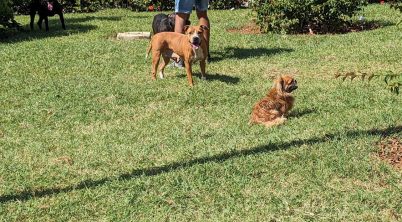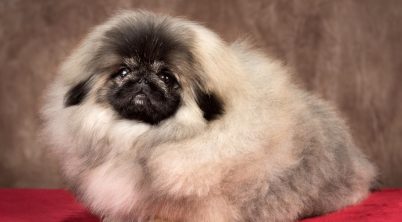The Pekingese is a toy dog breed that traces its origins to ancient China, where it was a companion for Chinese royalty. Known for their distinctive appearance, including a squashed face, short bowed legs, and floppy ears, Pekingese dogs are often perceived as regal and sophisticated. They have a loyal and affectionate temperament, making them excellent companions for their owners over their average 13-15 year lifespan.
As for intelligence, it is essential to understand where the Pekingese stands compared to other dog breeds. Ranking 73rd in obedience and working intelligence, these little dogs fall into the category of Lowest Degree of Working/Obedience Intelligence Dogs. However, this should not be viewed as a negative trait or a lack of overall intelligence. Instead, it reflects the breed’s initial purpose as a primary companion and should not discourage potential owners from appreciating these charming pets.
The Pekingese may be described as opinionated and stubborn, which means that while they may not perform as well in obedience tests, they still bring their own unique set of qualities to the table. Their strong will and independent thinking can make the relationship with their owners even more profound. For those who appreciate a lap dog with a sense of nobility and pride, the intelligence of a Pekingese offers just the right balance of intrigue and delight.
Pekingese Temperament
The Pekingese breed is known for its unique blend of intelligence, stubbornness, and independence. These dogs possess an alert and dignified personality, which contributes to their somewhat opinionated nature. As a toy breed, Pekingese can make wonderful lapdog companions, balancing their loyalty and affection with a strong sense of self.
While these dogs are considered intelligent, they also exhibit a stubborn streak that might pose challenges in training. Their courageous attitude and independent spirit can make them less prone to following commands blindly, and more interested in making their own decisions. However, when approached with patience and consistency, Pekingese can still become responsive and well-behaved pets.
The Pekingese temperament lends itself to a somewhat vocal personality. They may express themselves through barking, which is typically moderate rather than excessive. This vocal expression is often a result of their alertness and desire to communicate with their owners. While they may not be overly needy in terms of attention, Pekingese dogs do appreciate being acknowledged and cared for by their owners.
Overall, the Pekingese presents a fascinating blend of traits, including intelligence, stubbornness, and independence. Their dignified and alert nature contributes to a unique, strong-willed temperament that can make them both charming and challenging pets.
Companionship and Affection
The Pekingese dog breed is notably affectionate and loyal, making them excellent companions. Bred initially for Chinese royalty, it is no surprise that they develop strong bonds with their human family members. They often exhibit a friendly and social demeanor towards both their owners and others, adapting well to various settings.
This breed is known for its lapdog nature, delighting in snuggling and spending time near their favorite people. Pekingese are particularly suitable for households in search of an affectionate, smaller-sized pet. However, it is important to remember that while they may be small in stature, they possess a strong, independent spirit.
Socializing your Pekingese is essential to ensure that they maintain their friendly disposition and adapt to different people and environments. Regular interaction and exposure to other dogs, animals, and humans play a crucial role in the development of their sociable personality.
In summary, the Pekingese breed’s companionship and affectionate nature make them wonderful house pets and loyal friends. Yet, proper socialization and understanding of their independent character are imperative to nurturing a well-rounded relationship between the pet and owner.
Pekingese Training and Exercise
Pekingese dogs are an intelligent breed but may exhibit some stubbornness when it comes to training. It is crucial to start early socialization and expose them to different people, environments, and situations. This will help them become well-adjusted and adaptable pets. Consistent and positive reinforcement, along with patience, is vital for successful training.
In terms of exercise, the Pekingese is a moderately active breed due to its long-bodied, low structure, and somewhat bowed limbs. These physical characteristics contribute to their unique “rolling gait.” Though they do not require intense exercise, daily moderate levels of physical activity are essential to maintain their overall health. A leisurely walk, indoor play sessions, or engaging them in interactive games can be sufficient for their daily exercise needs.
When training a Pekingese, it is essential to keep in mind their trainability and obedience levels. Since they are likely to be headstrong, breaking the training sessions into shorter timeframes can be useful. This will help maintain their engagement and prevent them from getting bored or frustrated.
Overall, when considering training and exercise for a Pekingese, it is essential to strike the right balance between providing mental stimulation and ensuring they get the appropriate amount of physical activity. Keep in mind that ensuring a well-rounded upbringing for your Pekingese will contribute to a healthy and happy companion.
Pekingese Intelligence Ranking
The Pekingese breed is known for its unique appearance and strong-willed personality. When it comes to intelligence, the Pekingese is ranked 73rd among dog breeds, according to Stanley Coren’s research on dog intelligence. This places them in the category of “Lowest Degree of Working/Obedience Intelligence Dogs.”
Despite their lower ranking in working intelligence, Pekingese dogs can be quite alert and make excellent watchdogs. They are highly sensitive to their surroundings and will quickly notify their owners if something seems out of the ordinary. However, in terms of obedience and working intelligence, they may require more patience and consistent training compared to other breeds.
Stanley Coren’s research on dog intelligence ranks breeds based on the following categories: brightest dogs, excellent working dogs, and above average working dogs. The top-ranking breeds in this research include Border Collies, Poodles, German Shepherds, Golden Retrievers, and Doberman Pinschers. While the Pekingese may not fall into any of these categories, it is essential to remember that intelligence comes in various forms, and each breed possesses its unique strengths.
In conclusion, the Pekingese may not be among the most intelligent dog breeds when it comes to working and obedience intelligence, but their alertness and ability to serve as excellent watchdogs are undeniable. Their distinctive charm and strong-willed nature make them suitable for owners who are prepared to dedicate time and patience to training and understanding their needs.








